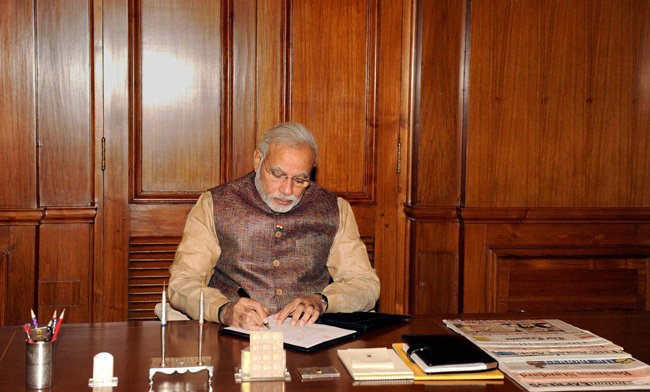Hits & Misses: 1 year of Modi Sarkar
June 17, 2015 | Wednesday | Features | By Rahul Koul Koul
Hits & Misses: 1 year of Modi Sarkar
Even though the review of policies so far have not been the massive, most agree that the style of governance has witnessed a sea change
The National Democratic Alliance government led by the Prime Minister, Mr Narendra Modi completed one year on May 26, 2015. A year before on the same day, there was euphoria over new governance and progress that could possibly usher in as a result of a majority stable government after a long time. Having been underestimated for long, the biotech sector was no different, with industry leaders and associations expressing optimism on the change of fortunes. A galore of demands were spoken of. So, have even a few of these been met or do the challenges remain the same? This is a question which may get answered while we take a look at a few of the decisions taken by the government.
Even though the review of policies so far have not been the massive, most agree that the style of governance has witnessed a sea change. Launch of new programs such as 'Make in India' and Swach Bharat' have exhibited the government's will to bring in change. These have found good connect with industry leaders who have lauded such initiatives.
For the health sector, the highlight of the year was certainly the release of the draft of the National Health Policy that recognized the relevance of medical technologies for a robust healthcare delivery system. The 'Make in India' campaign runs on science and technology, research and development, new processes, precision technology, innovation and skill and has tremendous potential to showcase the talent of Indians working in the lifescience domain and beyond.
As per Dr Manu Jaggi, chief scientific officer, Dabur Research Foundation, "Modi government has taken some proactive steps in the last one year, which have had a positive impact on the pharma industry· Allowing up to 100 percent FDI in medical devices in the pharmaceutical sector is a positive move. This is likely to attract more investments and boost domestic manufacturing. Provision of essential medicines at lower rates is also a welcome step from which many will benefit. In the last one year, more than 300 lifesaving medicines which are used to treat life threatening diseases have been brought under drug price control by the government."
Dr Kiran Mazumdar Shaw, chairperson, Biocon felt that national interest is foremost. In one of her tweets, she mentioned, "Partisan politics must stop and focus should be on important national needs. GST is an urgent need of the hour."
"Science and technology is of strategic importance to India's future leadership. India needs to step up its investment in research and translational innovation. We must identify key areas in which to build world-class scientific and technological excellence, for example, genomics, nanoscience, analytics, synthetic biology, information technology, space technology etc.," wrote Dr Shaw in Forbes India magazine. She has also asked the Modi government to look at incentivising innovation and IP creation is important for India's future growth prospects. "Enabling entrepreneurs to propel ideas into sustainable businesses will add value to our economy in the long run. The government should give R&D a boost by providing a 10-year tax holiday on products developed indigenously, provide tax breaks for venture funding, and allow zero duty on R&D equipment."
Soon after the new government took over, the process of charting out a new regulatory pathway for vaccines was started by the Central Drugs Standard Control Organization (CDSCO) which constituted three core working groups from within the industry. Each for strategy, technical operations and technical. Post approval, each group will come with its designated chairman and member secretary who will take things forward in a time bound manner. The new initiative is an outcome of the interaction between vaccine manufacturers and importers in the country and the Drug Controller General of India (DCGI) on January 15, 2015 at the FDA Bhawan, in New Delhi.
The dialogue between regulator and industry was on various issues, challenges, opportunities with respect to manufacturing of priority vaccines, including import of vaccines and regulatory pathways to promote a legal, regulatory and administrative framework for the safety of vaccines at national and international levels. With great potential to emerge as the country's key industrial contributor, the vaccine businesses have not been able to fully evolve due to regulatory hiccups.
Mr RK Suri, chief executive-biologicals, Panacea Biotec, mentioned, "It was indeed a new chapter on the anvil in the Indian regulatory space where the regulatory team under the able leadership of the DCGI, Dr GN Singh was clearly eager to translate the vision of our Prime Minister, Mr Narendra Modi to take India to the leadership level on the Vaccine map of the world in the next 5-6 years."









